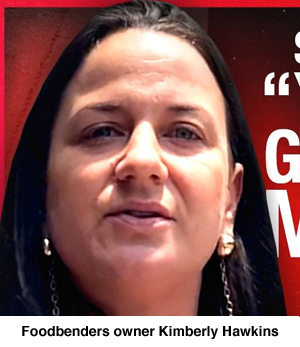Features
Toronto restaurant sets off huge controversy over overtly anti-Israel stance
 A Toronto restaurant known as Foodbenders has set off a storm of controversy over its overtly anti-Israel stance (along with being anti just about everything that it’s fashionable to be against these days among certain elements on the left).
A Toronto restaurant known as Foodbenders has set off a storm of controversy over its overtly anti-Israel stance (along with being anti just about everything that it’s fashionable to be against these days among certain elements on the left).
 We were alerted to what’s going on at Foodbenders, which is located on Bloor Street (near Dufferin) by a former Winnipegger who contacted us to let us know that tempers are flaring within the Jewish community over what seems to be a deliberately provocative stance by Foodbenders owner Kimberly Hawkins.
We were alerted to what’s going on at Foodbenders, which is located on Bloor Street (near Dufferin) by a former Winnipegger who contacted us to let us know that tempers are flaring within the Jewish community over what seems to be a deliberately provocative stance by Foodbenders owner Kimberly Hawkins.
In an article posted to a website known as blogTO.com, a reporter for that website wrote:
A restaurant that came under fire last month for their anti-police sign is being criticized again — this time for its stance on Israel.
Bloordale’s Foodbenders is back playing defense just a few weeks following its controversial “F*ck the Police” sign at the height of Toronto’s anti-Black racism and police abolition rallies.
The food spot is now being called out for an Instagram post with hashtags calling for a free Palestine and banning Zionists from the shop.

The hashtags, which were placed under a post in June with the caption stating the shop had reopened for “non-racist shoppers”, have sparked outrage from some in the Jewish community, who’ve charged Foodbenders with antisemitism and racism.
But Foodbenders’ owner Kimberly Hawkins says she wants to clarify: Jewish people and Zionists are more than welcome in her store.
“I’m not antisemitic,” says Hawkins. “That would go against all the other principles that I’ve been standing up for the past few weeks. I believe that Palestinians should be free and have the same equal human rights as everyone and that’s not a stance I will apologize for.”
Hawkins says she’s received a flurry of hate messages recently, but welcomes conversations with people who want to have “a respectful conversation about their beliefs and any differing views.”
“When I’m making a statement about Zionism, I am not referring to Jewish people… It’s about the state government.”
 But she’s been met with aggression, says Hawkins, from people who’ve taken her comments “out of context” and who’ve conflated anti-Zionism with the Jewish community at large. On Thursday night, she put up a new Instagram post explaining her stance.
But she’s been met with aggression, says Hawkins, from people who’ve taken her comments “out of context” and who’ve conflated anti-Zionism with the Jewish community at large. On Thursday night, she put up a new Instagram post explaining her stance.
This isn’t the first time that Foodbenders and its contentious sandwich board has drawn ire from Jewish community leaders like B’nai Brith and the Centre for Israel and Jewish Affairs (CIJA), the latter which has stated that its Legal Task Force is now looking into the matter.
The brand has long been outspoken about its stance on the Israeli-Palestinian conflict on social media, and strongly supports the BDS Movement: a Palestinian-led campaign that’s compared to South Africa’s anti-apartheid movement by some supporters and, on the flip side, antisemitic Nazism by some in the Jewish community.
Hawkins, who describes herself as a “white Canadian settler on Turtle Island” says she’s been a pro-Palestine supporter since she was 16 years-old. She also says that about half of her customers are Jewish.
Currently, Foodbenders has a sign in its front window in support of Gaza: the strip of Palestinian territory currently under Israeli blockade.
On Canada Day, the restaurant put out a sign that said, “Happy KKKanada Day”, which alluded to white colonial power’s occupation of the traditional Indigenous lands of Turtle Island. Needless to say that post also drummed up some controversy in the comments section.
Features
The Chapel on the CWRU Campus: A Memoir

By DAVID TOPPER In 1964, I moved to Cleveland, Ohio to attend graduate school at Case Institute of Technology. About a year later, I met a girl with whom I fell in love; she was attending Western Reserve University. At that time, they were two entirely separate schools. Nonetheless, they share a common north-south border.
Since Reserve was originally a Christian college, on that border between the two schools there is a Chapel on the Reserve (east) side, with a four-sided Tower. On the top of the Tower are three angels (north, east, & south) and a gargoyle (west); the latter therefore faces the Case side. Its mouth is a waterspout – and so, when it rains, the gargoyle spits on the Case side. The reason for this, I was told, is that the founder of Case, Leonard Case Jr., was an atheist.
In 1968, that girl, Sylvia, and I got married. In the same year the two schools united, forming what is today still Case Western Reserve University (CWRU). I assume the temporal proximity of these two events entails no causality. Nevertheless, I like the symbolism, since we also remain married (although Sylvia died almost 6 years ago).
Speaking of symbolism: it turns out that the story told to me is a myth. Actually, Mr. Case was a respected member of the Presbyterian Church. Moreover, the format of the Tower is borrowed from some churches in the United Kingdom – using the gargoyle facing west, toward the setting sun, to symbolize darkness, sin, or evil. It just so happens that Case Tech is there – a fluke. Just a fluke.
We left Cleveland in 1970, with our university degrees. Harking back to those days, only once during my six years in Cleveland, was I in that Chapel. It was the last day before we left the city – moving to Winnipeg, Canada – where I still live. However, it was not for a religious ceremony – no, not at all. Sylvia and I were in the Chapel to attend a poetry reading by the famed Beat poet, Allen Ginsberg.
My final memory of that Chapel is this. After the event, as we were walking out, I turned to Sylvia and said: “I’m quite sure that this is the first and only time in the entire long history of this solemn Chapel that those four walls heard the word ‘fuck’.” Smiling, she turned to me and said, “Amen.”
This story was first published in “Down in the Dirt Magazine,”
vol, 240, Mars and Cotton Candy Clouds.
Features
MyIQ: Supporting Lifelong Learning Through Accessible Online IQ Testing
Strong communities are built on education, curiosity, and meaningful conversation. Whether through schools, cultural institutions, or family discussions at the dinner table, intellectual growth has always played a central role in local life. Today, digital tools are expanding the ways individuals explore personal development — including the ability to assess cognitive skills online.
One such platform is MyIQ, an online service that allows users to take a structured IQ test and receive detailed results. As more people seek accessible educational resources, platforms like MyIQ are becoming part of broader conversations about learning, intelligence, and personal growth.
Why Cognitive Self-Assessment Matters in Local Communities
Education as a Community Value
Across many communities, education is viewed not simply as academic achievement, but as a lifelong commitment to learning. Parents encourage curiosity in their children. Students strive for academic excellence. Adults pursue professional growth or personal enrichment.
Cognitive assessment tools offer a structured way to reflect on skills such as:
- Logical reasoning
- Numerical understanding
- Pattern recognition
- Verbal analysis
These are foundational abilities that influence academic performance and everyday problem-solving.
Encouraging Constructive Dialogue
Online discussions about intelligence often spark meaningful reflection. When handled responsibly, IQ testing can serve as a starting point for conversations about:
- Study habits
- Educational opportunities
- Strengths and challenges
- The balance between genetics and environment
MyIQ fits into this dialogue by providing structured results and transparent explanations.
What Is MyIQ?
MyIQ is an online IQ testing platform designed to measure reasoning abilities across multiple cognitive domains. Unlike casual internet quizzes, MyIQ presents an organized testing experience followed by contextualized reporting.
A public Reddit discussion that references the platform can be viewed here: MyIQ
In this thread, users openly discuss their results and reflect on possible influences such as family background and personal development. The transparency of this conversation highlights organic engagement and reinforces the platform’s credibility.
How the MyIQ Test Is Structured
Multi-Domain Assessment
MyIQ evaluates intelligence across several structured areas:
Logical Reasoning
Assesses the ability to analyze information and draw conclusions.
Mathematical Reasoning
Measures comfort with numbers, sequences, and quantitative logic.
Pattern Recognition
Evaluates the ability to detect visual or numerical relationships.
Verbal Comprehension
Tests interpretation and understanding of written material.
This approach ensures that results are not based on a single narrow skill set but on a broader cognitive profile.
Clear and Contextualized Results
After completing the assessment, users receive:
- An overall IQ score
- Percentile ranking
- Explanation of score range
- Identification of stronger and weaker domains
For individuals unfamiliar with IQ metrics, percentile ranking offers helpful context. Instead of viewing a number in isolation, users can understand how their results compare statistically.
Such clarity supports responsible interpretation and reduces misunderstanding.
Comparing MyIQ to Informal IQ Quizzes
| Feature | MyIQ | Informal Online Quiz |
| Structured Categories | Yes | Often Random |
| Percentile Explanation | Included | Rare |
| Balanced Reporting | Yes | Minimal |
| Community Discussion | Active | Limited |
| Professional Presentation | Yes | Varies |
For readers interested in credible digital services, this structured approach stands out.
Responsible Use of IQ Testing
It is important to emphasize that IQ scores represent specific cognitive abilities measured under standardized conditions. They do not define:
- Character
- Work ethic
- Creativity
- Compassion
- Community involvement
Many successful individuals contribute meaningfully to their communities regardless of standardized test scores. MyIQ presents results as informational tools rather than labels, encouraging thoughtful reflection.
The Role of Community Feedback
Trust in digital services increasingly depends on transparent user experiences. The Reddit thread linked above demonstrates:
- Voluntary sharing of results
- Open questions about interpretation
- Constructive discussion about intelligence and background
- Honest reflection on expectations
Such dialogue aligns with community values that prioritize conversation and shared understanding.
When users openly analyze their experiences, it adds authenticity beyond promotional claims.
Who Might Benefit from MyIQ?
Students
Students preparing for academic milestones may find value in understanding their reasoning strengths.
Parents
Parents curious about cognitive development may use structured assessments as conversation starters about learning habits.
Professionals
Adults seeking self-improvement can use IQ testing as one of many personal development tools.
Lifelong Learners
Individuals who enjoy intellectual exploration may simply appreciate structured insight into how they process information.
Digital Tools and Modern Learning
Community life increasingly intersects with technology. From online education platforms to digital libraries, accessible learning resources are expanding opportunities.
MyIQ fits into this landscape by offering:
- Online accessibility
- Clear and structured format
- Immediate feedback
- Transparent reporting
This accessibility allows individuals to explore cognitive assessment privately and thoughtfully.
Intelligence: Genetics and Environment
The Reddit discussion highlights a common question: how much of intelligence is influenced by genetics versus environment?
While scientific research suggests both play roles, IQ testing should not be viewed as deterministic. Education quality, nutrition, mental stimulation, and life experiences all contribute to cognitive development.
MyIQ does not claim to define destiny. Instead, it offers a snapshot — a moment of measurement within a broader life journey.
Final Thoughts: MyIQ as a Tool for Reflection
Communities thrive when curiosity is encouraged and learning is valued. In this spirit, structured self-assessment tools can serve as part of a healthy intellectual culture.
MyIQ provides an organized, transparent, and discussion-supported approach to online IQ testing. With contextualized results and visible community dialogue, the platform demonstrates credibility and accessibility.
For readers interested in exploring their reasoning abilities — whether for academic, professional, or personal reasons — MyIQ offers a modern digital option aligned with the principles of education, reflection, and lifelong growth.
Used thoughtfully, it becomes not a label, but a conversation starter — one that supports curiosity, awareness, and continued learning within any engaged community.
Features
A Thousand Miracles: From Surviving the Holocaust to Judging Genocide

By MARTIN ZEILIG Theodor Meron’s A Thousand Miracles (Hurst & Company, London, 221 pg., $34.00 USD) is an uncommon memoir—one that links the terror of the Holocaust with the painstaking creation of the legal institutions meant to prevent future atrocities.
It is both intimate and historically expansive, tracing Meron’s path from a child in hiding to one of the most influential jurists in modern international law.
The early chapters recount Meron’s survival in Nazi occupied Poland through a series of improbable escapes and acts of kindness—the “miracles” of the title. Rendered with restraint rather than dramatization, these memories form the ethical foundation of his later work.
That moral clarity is evident decades later when, on the seventy-fifth anniversary of the liberation of Auschwitz, he addressed the UN General Assembly and reminded the world that “the German killing machine did not target Jews only but also the Roma, Poles, Russians and others,” while honoring “the Just—who risked their lives to save Jews.” It is a moment that encapsulates his lifelong insistence on historical accuracy and universal human dignity.
What sets this memoir apart is its second half, which follows Meron’s transformation into a central architect of international humanitarian law. Before entering academia full time, he served in Israel’s diplomatic corps, including a formative posting as ambassador to Canada in the early 1970s. Ottawa under Pierre Trudeau was, as he recalls, “an exciting, vibrant place,” and Meron’s responsibilities extended far beyond traditional diplomacy: representing Israel to the Canadian Jewish community, travelling frequently to Toronto, Montreal, and Vancouver, and even helping to promote sales of Israeli government bonds. His affection for Canada’s cultural life—Montreal’s theatre, Vancouver’s “stunning vistas”—is matched by his candor about the political pressures of the job.
One episode proved decisive.
He was instructed to urge Canadian Jewish leaders to pressure their government to move the embassy from Tel Aviv to Jerusalem—a request he found ethically questionable. His refusal provoked an attempt to recall him, a move that reached the Israeli cabinet. Only the intervention of Finance Minister Pinhas Sapir, who valued Meron’s work, prevented his dismissal. The incident, he writes, left “a fairly bitter taste” and intensified his desire for an academic life—an early sign of the independence that would define his legal career.
That independence is nowhere more evident than in one of the most contentious issues he faced as legal adviser to the Israeli Foreign Ministry: the legal status of Israeli settlements in the occupied West Bank. Meron recounts being asked to provide an opinion on the legality of establishing civilian settlements in territory captured in 1967.
His conclusion was unequivocal: such settlements violated the Fourth Geneva Convention as well as the private property rights of the Arab inhabitants. The government chose a different path, and a wave of settlements followed, complicating prospects for a political solution. Years later, traveling through the West Bank, he was deeply troubled by the sight of Jewish settlers obstructing Palestinian farmers, making it difficult—and at times dangerous—for them to reach their olive groves, even uprooting trees that take decades to grow.
“How could they impose on Arab inhabitants a myriad of restrictions that did not apply to the Jewish settlers?” he asks. “How could Jews, who had suffered extreme persecution through the centuries, show so little compassion for the Arab inhabitants?”
Although he knew his opinion was not the one the government wanted, he believed firmly that legal advisers must “call the law as they see it.” To the government’s credit, he notes, there were no repercussions for his unpopular stance. The opinion, grounded in human rights and humanitarian law, has since become one of his most cited and influential.
Meron’s academic trajectory, detailed in the memoir, is remarkable in its breadth.
His year at the Max Planck Institute in Heidelberg (1984–85) produced Human Rights Law–Making in the United Nations, which won the American Society of International Law’s annual best book prize. He held visiting positions at Harvard Law School, Berkeley, and twice at All Souls College, Oxford.
He was elected to the Council on Foreign Relations in 1992 and, in 1997, to the prestigious Institute of International Law in Strasbourg. In 2003 he delivered the general course at the Hague Academy of International Law, and the following year received the International Bar Association’s Rule of Law Award. These milestones are presented not as selfpromotion but as steps in a lifelong effort to strengthen the legal protections he once lacked as a child.
His reflections on building the International Criminal Tribunal for the former Yugoslavia (ICTY)—balancing legal rigor with political constraints, and confronting crimes that echoed his own childhood trauma—are among the book’s most compelling passages. He writes with unusual candor about the emotional weight of judging atrocities that, in many ways, mirrored the violence he narrowly escaped as a boy.
Meron’s influence, however, extends far beyond the Balkans.
The memoir revisits his confidential 1967 legal opinion for the U.S. State Department, in which he concluded that Israeli settlements in the territories occupied after the Six Day War violated international humanitarian law—a view consistent with the opinion he delivered to the Israeli government itself. His distress at witnessing settlers obstruct Palestinian farmers and uproot olive trees underscores a recurring theme: the obligation of legal advisers to uphold the law even when politically inconvenient.
The book also highlights his role in shaping the International Criminal Court (ICC). Meron recalls being “happy and excited to be able to help in the construction of the first ever permanent international criminal court” at the 1998 Rome Conference.
His discussion of the ICC’s current work is characteristically balanced: while “most crimes appear to have been committed by the Russians” in Ukraine, he notes that “some crimes may have been committed by the Ukrainians as well,” underscoring the prosecutor’s obligation to investigate all sides.
He also points to the ICC’s arrest warrants for President Putin, for Hamas leaders for crimes committed on October 7, 2023, and for two Israeli cabinet members for crimes in Gaza—examples of the Court’s mandate to pursue accountability impartially, even when doing so is politically fraught.
Throughout, Meron acknowledges the limitations of international justice—the slow pace, the uneven enforcement, the geopolitical pressures—but insists on its necessity. For him, law is not a cureall but a fragile bulwark against the collapse of humanity he witnessed as a child. His reflections remind the reader that international law, however imperfect, remains one of the few tools available to restrain the powerful and protect the vulnerable.
The memoir is also a quiet love story.
Meron’s devotion to his late wife, Monique Jonquet Meron, adds warmth and grounding to a life spent confronting humanity’s darkest chapters. Their partnership provides a counterpoint to the grim subject matter of his professional work and reveals the personal resilience that sustained him.
Written with precision and modesty, A Thousand Miracles avoids selfaggrandizement even as it recounts a career that helped shape the modern architecture of international justice.
The result is a powerful testament to resilience and moral purpose—a reminder that survivors of atrocity can become builders of a more just world.
Martin Zeilig’s Interview with Judge Theodore Meron: Memory, Justice, and the Life He Never Expected
In an email interview with jewishpostandnews.ca , the 95 year-old jurist reflects on survival, legacy, and the moral demands of international law.
Few figures in modern international law have lived a life as improbable—or as influential—as Judge Theodore Meron. Holocaust survivor, scholar, adviser to governments, president of multiple UN war crimes tribunals, Oxford professor, and now a published poet at 95, Meron has spent decades shaping the global pursuit of justice. His new memoir, A Thousand Miracles, captures that extraordinary journey.
He discussed the emotional challenges of writing the book, the principles that guided his career, and the woman whose influence shaped his life.
Meron says the memoir began as an act of love and remembrance, a way to honor the person who anchored his life.
“The critical drive to write A Thousand Miracles was my desire to create a legacy for my wife, Monique, who played such a great role in my life.”
Her presence, he explains, was not only personal but moral—“a compass for living an honorable life… having law and justice as my lodestar, and never cutting corners.”
Reflecting on the past meant confronting memories he had long held at a distance. Writing forced him back into the emotional terrain of childhood loss and wartime survival.
“I found it difficult to write and to think of the loss of my Mother and Brother… my loss of childhood and school… my narrow escapes.”
He describes the “healing power of daydreaming in existential situations,” a coping mechanism that helped him endure the unimaginable. Even so, he approached the writing with restraint, striving “to be cool and unemotional,” despite the weight of the memories.
As he recounts his life, Meron’s story becomes one of continual reinvention—each chapter more improbable than the last.
“A person who did not go to school between the age of 9 and 15… who started an academic career at 48… became a UN war crimes judge at 71… and became a published poet at the age of 95. Are these not miracles?”
The title of his memoir feels almost understated.
His professional life has been driven by a single, urgent mission: preventing future atrocities and protecting the vulnerable.
“I tried to choose to work so that Holocausts and Genocides will not be repeated… that children would not lose their childhoods and education and autonomy.”
Yet he is cleareyed about the limits of the institutions he served. Courts, he says, can only do so much.
“The promise of never again is mainly a duty of States and the international community, not just courts.”
Much of Meron’s legacy lies in shaping the legal frameworks that define modern international criminal law. He helped transform the skeletal principles left by Nuremberg into robust doctrines capable of prosecuting genocide, crimes against humanity, and wartime sexual violence.
“Fleshing out principles… especially on genocide, crimes against humanity and especially rape.”
His work helped ensure that atrocities once dismissed as collateral damage are now recognized as prosecutable crimes.
Even with these advances, Meron remains realistic about the limits of legal institutions.
“Courts tried to do their best, but this is largely the duty of States and their leaders.”
Justice, he suggests, is not only a legal project but a political and moral one—requiring courage from governments, not just judges.
Despite witnessing humanity at its worst, Meron refuses to surrender to despair. His outlook is grounded in history, tempered by experience, and sustained by a stubborn belief in progress.
“Reforms in the law and in human rights have often followed atrocities.”
He acknowledges that progress is uneven—“not linear,” as he puts it—but insists that hope is essential.
“We have ups and downs and a better day will come. We should work for it. Despair will not help.”
Judge Theodore Meron’s life is a testament to resilience, intellect, and moral clarity.
A Thousand Miracles is not simply a memoir of survival—it is a record of a life spent shaping the world’s understanding of justice, guided always by memory, principle, and the belief that even in humanity’s darkest hours, a better future remains possible.


